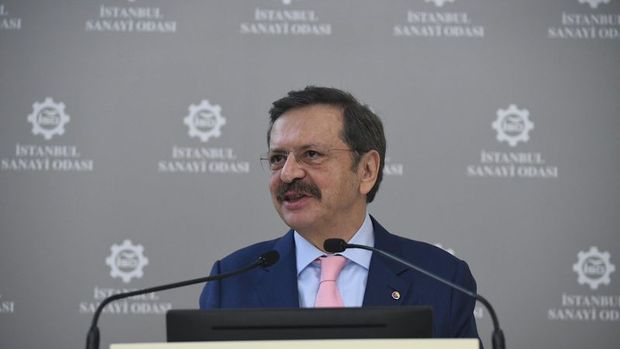TOBB/Hisarcıklıoğlu: Commercial loans should not be cut suddenly
Rifat Hisarcıklıoğlu, President of the Union of Chambers and Commodity Exchanges of Turkey (TOBB), stated that the contraction in SME loans had a negative impact on the entire country and sectors with a chain reaction and said, "We need to pay attention to this. Turkey's priority should be to protect its current production capacity. Commercial loans should not be cut suddenly and too harshly. The real sector's demands for access to financing should not be viewed negatively in a wholesale manner." The July regular meeting of the Istanbul Chamber of Industry (ISO) Assembly was held at the Odakule Fazıl Zobu Assembly Hall with the main agenda of "The Role, Importance and Expectations of Our Umbrella Organization TOBB in Solving the Problems of Our Industry and Production Life." TOBB President Rifat Hisarcıklıoğlu, ISO Board of Directors President Erdal Bahçıvan and members of the assembly attended the meeting. Speaking at the meeting, Hisarcıklıoğlu said that the share of industry in national income had reached 27 percent, the highest level in the last 20 years. Hisarcıklıoğlu stated that long-term investment financing opportunities should be increased and said, "The Central Bank's investment credits should be continued, and even its capacity for technology projects should be increased. Because we need large-scale key technology investments to reduce our current deficit and get a larger share of global supply chains. We should also redesign our incentive system accordingly. We believe that if we bring at least 5 civil technology investments similar to TOGG to our country, we will make a great leap forward in technology." “We welcomed the normalization steps” Pointing out that the business world wants predictability and expects a roadmap for the future, Hisarcıklıoğlu noted the following: “In order to make business plans, see the future and thus move forward with confidence, it is important for the public to share medium and long-term plans regarding the economy with the public. In this context, we came together with our Vice President Cevdet Yılmaz last week. We conveyed our suggestions regarding the Medium-Term Program, which is the roadmap for the economy and is expected to be announced in September. Of course, ensuring stability and confidence in the macroeconomy is a prerequisite for our industry to survive and continue to grow. We welcomed the normalization steps initiated by the new economy administration in this direction and monetary policy. The contraction experienced in SME loans in particular is negatively reflected in the entire country and sectors with a knock-on effect. Attention should be paid to this. Turkey’s priority should be to protect its current production capacity. Commercial loans should not be cut suddenly and very harshly. The real sector’s demands for access to financing should not be viewed negatively in a wholesale manner. An important development took place in this context yesterday. The volume of rediscount credits and the share allocated to SMEs were increased, and access conditions were facilitated. The additional 30 percent foreign exchange sales obligation was lifted. We welcome all these simplification steps and hope they will continue. “The tax system needs reform” Rıfat Hisarcıklıoğlu, drawing attention to the fact that the tax system in Turkey needs reform, said, “We really do have a very complicated tax system. Moreover, we make it even more complicated every year. Due to a small number of bad examples that abuse, we make the lives of millions of taxpayers even more difficult. This gradually increases tax disputes. We need to change this approach. Our VAT system has unfortunately become a financing problem for the private sector. The refund of non-deductible VAT should be provided at the end of each year, an offset opportunity should be introduced for the accumulated-carrying VAT stock, and a simpler system should be adopted for VAT refunds and refund processes should be accelerated. Income tax brackets should be rearranged by taking into account past inflation." ISO President Erdal Bahçıvan stated that in an environment where contradictions between growth, price stability and financial stability objectives are increasing and the room for maneuver is narrowing, monetary policy errors and systemic financial fluctuations stand out as fundamental risks and the increase in global interest rates is increasing the pressure on all economies. Stating that domestic savings in Turkey are insufficient to finance growth, Bahçıvan made the following assessments: "It is more important than ever for international capital inflows to have a permanent and healthy structure, and especially for the share of direct qualified investments to be increased in financing. In this context, the agreements reached in many areas such as defense industry, technology, renewable energy within the scope of the official visits paid to the Gulf countries in recent days regarding investment, trade and external financing are promising for our country. The agreement reached regarding Sweden's accession to NATO is also valuable in terms of signaling a normalization in our country's foreign relations. With the support of this positive climate, our greatest wish is for the problems we have with the EU, especially the updating of the Customs Union, to enter the path of solution. I would like to remind you once again that urgent steps should be taken to ease the visa problem, which has become one of the most serious obstacles for our business people in recent times."


